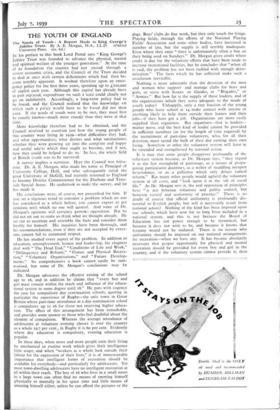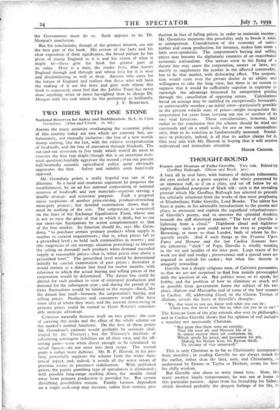THE YOUTH OF ENGLAND
IN his preface to this book Lord Portal says " King George's Jubilee Trust was founded to advance the physical, mental and spiritual welfare of the younger generation." At the time of its foundation the country had just passed through a severe economic crisis, and the Council of the Trust decided to deal at once with certain deficiencies which had then be- come terribly apparent. It worked therefore upon an emer- gency policy for the first three years, spending up to £roo,000 of capital each year. Although this capita! has already been in part replaced, expenditure on such a scale could clearly not go on indefinitely. Accordingly, a long-term policy had to be found, and the Council realised that the knowledge on which such a policy would have to be based did not then exist. If the needs of youth were to be met, they must first be exactly known—much more exactly than they were at that time.
More knowledge therefore had to .be obtained, and the Council resolved to ascertain just how the young people of
this country were living in 1939—what difficulties they had,
and what opportunities; what desires and what satisfactions; whether they were growing up into the complete and happy and useful adults which they ought to become, and if not, how they could be helped to do so. In fact, the whole field of British youth was to be surveyed.
A survey implies a surveyor. Here the Council was fortu- nate. Dr. A. E. Morgan, who made his name as Principal of University College, Hull, and who subsequently ruled the great University of McGill, had recently returned to England to become District Commissioner for the Durham and Tyne- side Special Areas. He undertook to make the survey, and he has made it.
His conclusions were, of course, not prescribed for him. If you set a vigorous mind to consider a problem which no one has considered as a whole before, you cannot expect to get opinions with which no one will quarrel. And some of Dr. Morgan's opinions will certainly provoke opposition. But he did not set out to make us think what we thought already. He set out to ascertain and assemble the facts and consider them freshly for himself. His inquiries have been thorough, and his recommendations, even if they are not accepted by every- one, cannot fail to command respect.
He has studied every aspect of his problem. In addition to education, unemployment, leisure and leadership, his chapters deal with " The Dead End," " Conditions of Life and Work," " Delinquency and Reform," " Games and Physical Recrea- tion," " Voluntary Organisations," and " Future Develop- ments." So comprehensive a book cannot easily be sum- marised, but some of Dr. Morgan's conclusions may be indicated.
Dr. Morgan advocates the effective raising of the school age to 16, and in addition he claims that " every boy and girl must remain within the reach and influence of the educa- tional system to some degree until 18." He puts with cogency the case for compulsory day continuation schools, quoting in particular the experience of Rugby—the only town in Great Britain where part-time attendance at a day continuation school is compulsory up to i6 for those not receiving higher educa- tion. The effect of this arrangement has been remarkable, and provides some answer to those who feel doubtful about the element of compulsion. Whereas the average attendance of adolescents at voluntary evening classes is over the country as a whole 19.7 per cent., in Rugby it is 6o per cent. Evidently where day education is compulsory, evening education is popular.
In these days, when more and more people earn their living by mechanical or routine work which gives their intelligence little scope, and when "workers as a whole look outside their labour for the expression of their lives," it is of immeasurable Importance that intelligent forms of recreation should be available for everybody—and particularly for adolescents. Yet most town-dwelling adolescents have no intelligent recreation at all within their reach. The boy of 16 who lives in a small street in a large town can often find no means of exerting himself physically or mentally in his spare time and little means of amusing himself either, unless he can afford the pictures or the dogs. Boys' clubs do fine work, but they only touch the fringe. Playing fields, through the efforts of the National Playing Fields' Association and some other bodies, have increased in number of late, but the supply is still terribly inadequate. Even where they exist " there is unfortunately often a ban on their being used on Sundays." Dr. Morgan gives credit where credit is due for the voluntary efforts that have been made to increase recreational facilities, but he concludes that "when all is said, the problem has not been tackled with enough deter- mination." The facts which he has collected make such a conclusion inevitable.
Nothing is more admirable than the devotion of the men and women who support and manage clubs for boys and 'girls, or serve with Scouts or Guides, or "Brigades," or " Armies." But how far is the supply of these leaders, and of the organisations which they serve adequate to the needs of youth today? Unhappily, only a tiny fraction of the young people who leave school at 14 make contact with anyone or anything likely to help them outside their homes and their jobs—if they have got a job. Organisations are more easily supplied than organisers. But organisers—that is leaders— matter more, and the best kind of leader cannot be provided in sufficient numbers (or for the length of time required) by the recruitment of part-time volunteers, who, for all their devotion, must spend the bulk of their day earning their own living. Somehow or other the voluntary system will have to be extended and strengthened by national action.
It is true that some people disapprove profoundly of the voluntary system because, as Dr. Morgan says, " they regard it as the last stronghold of patronage, as a means of propa- gating particularist doctrines, as a welter of muddling inexpert benevolence, or as a palliative which only delays radical reform." But many other people would uphold the voluntary system at all costs, and " look upon it as the ralt of social life." As Dr. Morgan sees it, the real opposition of principles here " is not between voluntary and public control, but between variet}t and uniformity of practice." There is no doubt of course that official uniformity is profoundly dis- tasteful to English people, but will it necessarily result from national action? Nothing of the kind has been imposed upon our schools, which have now for so long been included in a national system, and this is not because the Board of Education has not power enough to be tyrannical, but because it does not wish to be, and because it knows that tyranny would not be endured. There is no reason why uniformity should be imposed on our national arrangements for recreation—when we have any. It has became absolutely necessary that proper opportunity for physical and mental recreation should be provided for every boy and girl in the country, and if the voluntary system cannot provide it, then
the Government must do so. Such appears to be Dr. Morgan's conclusion.
But his conclusions, though of the greatest interest, are not the best part of the book. His review of the facts and his clear exposition of their significance, the broad picture he has given of young England as it is and his vision of what it might be—these give the book the greater part of its value. Here is a man, the reader feels, who knows England through and through and whose love for it is wise and discriminating as well as deep. Anyone who cares for the future of England and realises that those who will have the making of it are the boys and girls with whom this book is concerned, must feel that the Jubilee Trust has never done anything wiser or more far-sighted than to charge Dr. Morgan with the task which he has performed so brilliantly.
J. F. ROXBURGH.











































 Previous page
Previous page